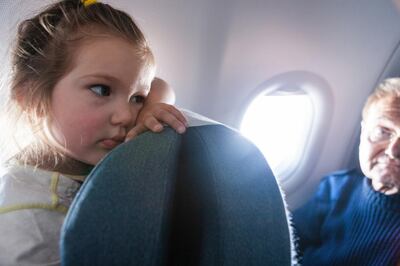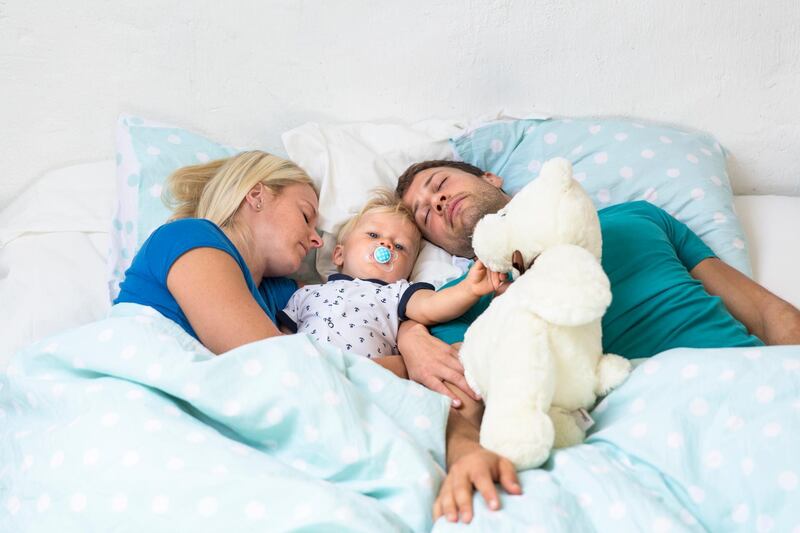If sleep, or rather how awful the lack of it makes us feel, is a subject upon which all parents can agree, how best to manage the source of that sleep deprivation is infinitely more contentious. And it all begins from day one.
Young and restless
For the first few weeks, it’s the size of a newborn’s stomach that determines how often children need to feed, waking everyone with their hungry cries around the clock. Trying to work out how to feed, soothe and settle a baby into a routine can be extremely stressful. At new mother and baby groups across the UAE, as elsewhere, the first woman who can claim that her baby sleeps through the night is regarded with a mix of exhaustion, awe and outright envy. How did she do it?
For mum-of-two Kate Sansom, Gina Ford's bestselling parenting manual The Contented Little Baby Book provided the answer. Ford's solution is a strict schedule for parents to encourage babies to feed well and sleep during the night from an early age.
Living abroad without family to lean on also shaped how Sansom tackled first-time motherhood. “Our friends were all in the same boat – we all had new babies and none of us knew what we were doing. It felt more important to me to take control of the situation,” she says.
There isn’t a single “correct” way to get your baby into a sleep-wake routine; some parents stick rigidly to a schedule, while others let their offspring feed on demand and sleep the same way. According to the National Sleep Foundation in the United States, the key is understanding that age determines how long children need to rest. For newborn babies, whose brains and bodies are developing rapidly, that means around 14 to 17 hours of sleep over each 24-hour period. The length of night-time sleeps and daytime naps gradually diminishes over time until, between ages three and five, children will need 10 to 13 hours of sleep every 24 hours.
Dr Greg Elder, associate director of the Northumbria Sleep Research Laboratory at the University of Northumbria, explains that while age has the greatest impact on the number of hours kids need to snooze, within the scope of recommended guidelines, individual needs vary. “At a broad level, not everyone sleeps for the same amount of time; some people are short sleepers and some people are longer sleepers.
"There have been some research studies that suggest there may be a genetic component to sleep – a recent study indicates genes such as BHLHE41/DEC2 show that some people are not only naturally short sleepers, but might even be more resistant to the effects of sleep loss," explains Elder.
Travel tricks
No matter how expertly tuned your toddler’s sleep routine, travelling with kids is a challenge that parents who are residents of the UAE face more often than most. But thanks to the body’s circadian rhythm, Elder says there’s no quick fix to getting kids’ sleep patterns adjusted to a new local time.

“We feel sleepy or awake because of a very finely tuned balance between two things: how long we have been awake for – our ‘sleep pressure’ – and our circadian rhythm. If we have been awake for a long time then this increases our sleep pressure, which makes us want to sleep. At the same time, we have a circadian element – a clock-like process, which is unaffected by sleep deprivation.”
Jet lag occurs when the body’s master clock, a group of cells in the brain called the suprachiasmatic nucleus in the hypothalamus, does not receive regular daylight signals through our eyes, says Elder. When this happens, after prolonged periods on a plane for example, the body clock resets to its natural cycle, which is slightly longer than 24 hours. This affects our ability to feel sleepy at night.
Former Abu Dhabi resident Lori Stearns has taken approximately 70 flights with her eight-year-old daughter, and the family would regularly brave stopovers for a few days’ holiday en route from the UAE to their home in the US.
“We travelled with a stroller up until Claudia was six and a half, and we let her take naps in it if she needed to,” Stearns says. “We forced ourselves to stay awake, but found that if the adults and child were overtired and crabby, it didn’t make for a fun time. So we just let her sleep when she needed to sleep.
“You would think it would backfire, and she’d be awake all night when we all finally turned in, but for the most part she would go to sleep at night as well.”
For Lode Olivier, who regularly travels from Abu Dhabi with her four children, who are 10, eight, six and three, booking daytime flights is critical to everyone’s well-being. “Night-time doesn’t work for us because they just don’t sleep and I think everyone is more rested if you fly in the day,” she says.
When the family lands, they take it easy for 48 hours to allow everyone to get used to being on a new timetable. White noise, a suitably dark bedroom, a favourite toy and familiar pillow all help promote sleep in a new location. Most importantly, when it is time for bed, Olivier and her husband “divide and conquer”, taking two children each and settling down in separate rooms.
“The most important thing for us is to get sleep. [My husband and I] don’t see each other that much on a holiday, but for us it works to make sure that everyone sleeps, and everyone is happy when they sleep.”
Landing back in the UAE well before school started was intrinsic to Stearns’s holiday planning. “We always went by the rule of one day per time zone to recover from jet lag. I would give Claudia three to four days just to sleep as needed and then start waking her up earlier by 10 to 15 minutes each day.
“I want to add, I know plenty of UAE parents who were on a tighter schedule with their flights and came back as late as they could. The kids started back at school right away and everyone survived just fine.”
The teen years
While parents can elect how and when and where they travel, they cannot stop kids growing up or avoid the teenage years. The age from 14 to 17 can be fraught for any number of reasons, including changes to teenagers’ sleep cycle caused by their brain development.
While school-age children need about nine to 11 hours of solid slumber, teens can thrive on eight to 10 hours, but changes to melatonin levels in the brain mean teens don’t feel sleepy until later. Being a night owl might suit a heavier homework load, but teenagers can struggle to wind down in time to gain sufficient sleep before the morning.
If you face a grumpy teen at the breakfast table, it might be that they need to improve their bedtime routine. According to medical advice, mobile phones should be put away at least 90 minutes before bedtime and kids shouldn’t watch television on a mobile phone; the blue light mobiles emit resembles melatonin-suppressing daylight, while apps such as Snapchat stimulate dopamine in the brain, making it hard to put them down or feel sleepy. It may also be helpful to make sure that the bedroom becomes a place reserved for sleep alone.

Letting kids lie in at the weekend might be popular, but it’s unhelpful says Dr Irshaad Ebrahim, a consultant neuropsychiatrist and medical director of the London Sleep Centre in Dubai. He advocates waking teenagers up at the same time each day, including at the weekend to prevent further disruption to sleep patterns.
For a small proportion of teens who cannot fall asleep before 2am or 3am, the delay to their sleep cycle results in chronic sleep deprivation. “You have behavioural issues and cognitive issues,” Dr Ebrahim says. “Academic performance can suffer and they get into a vicious cycle.”
When sleep begins to affect a teen's waking hours, it's time to call in the experts, Dr Ebrahim says. A sleep specialist is likely to prescribe a low dose of melatonin to induce a feeling of sleep earlier in the evening, which along with a helpful bedtime routine should ensure sufficient rest. And that's good news for everyone. After all, if they sleep, so can you.







